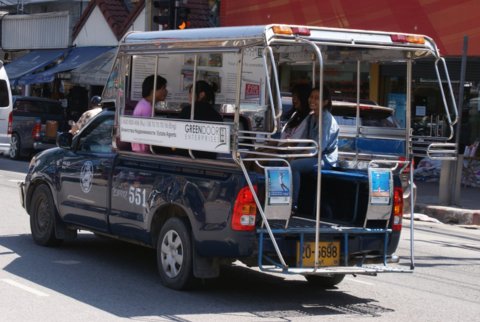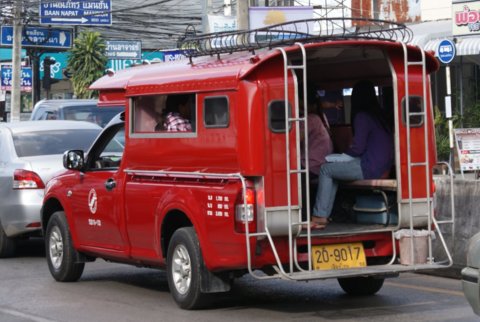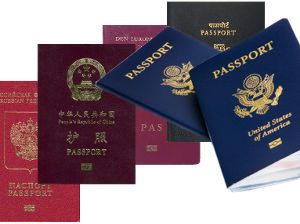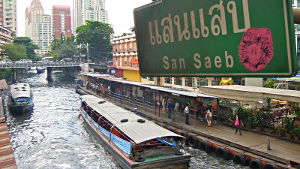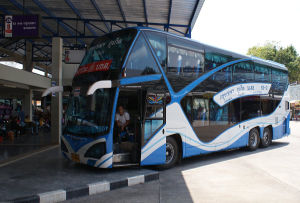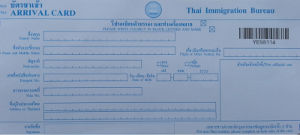Grab a Songthaew in Thailand
A songthaew is a modified pick-up or truck used as a bus or taxi.
A songthaew has two benches on the back of the truck and a roof to protect the passengers from the weather. The Thai word Songthaew means two rows in English. In addition to the benches, typically, the songthaew has a platform attached to the rear, allowing passengers to stand; thus allowing more passengers.
This article contains prices in Thai baht and in the currency of your choice. The exchange rates are the latest rates from Bank of Thailand ().
The current currency is baht; the exchange rate is 100 baht = 100 baht.
Choose another currency:
We save your choice in a cookie to remember it for other articles.

In many cities, the songthaew has two functions: as a cheap bus or as a taxi.
No matter if the songthaew acts as a bus or as a taxi, you hail it by holding out your arm pointing downwards as on the photo. In addition, you can wave your hand up and down to get the driver's attention.
The Songthaew As a Bus
As a bus the songthaew, usually, follows a specific route, you can stop it anywhere by signalling to the driver you want a ride (see above). When you walk, you do not have to keep looking back to see if a songthaew is coming; usually, the driver will offer you a ride by honking his horn as he gets near you.
When you reach your destination or if the songthaew no longer goes the way you want to go, you push the buzzer to tell the driver to stop; he will then stop as soon as possible.
As a tourist, it can be hard to know if the songthaew goes the way you want to go and where to get off. You can ask the driver; however, the bus may then magically transform into a taxi with much higher rates, see below. It will be better to ask another passenger or to use Google Maps on your mobile phone to see if you are going in the right direction and where to get off.
When you get off, go to the window on the passenger side (away from the traffic) and pay. Be sure to have the correct fare as the driver may not have change or may not want to spend time to give change if you pay too much. Don't worry about paying too little; he will surely let you know if he wants more.
In some places, they list the fare on a poster inside the songthaew. In Pattaya, the going rate is 10 baht (10 baht) for short trips and 20 baht (20 baht) for longer trips, like from Jomtien Beach to Pattaya. Here, the songthaews that work as buses are also known as baht bus.
When a songthaew works as a bus, the fare is per person.
In some places, you will find a songthaew bus build from a truck. The one in the photo is on a route between Patong and Phuket Town:
The truck songthaew never acts as a taxi. You do not pay the driver; instead, you buy a ticket from a ticket seller inside the bus.
The Songthaew As a Taxi
If you hail a driving songthaew and ask if it goes to a specific destination, the driver may decide to work as a taxi – even if there are other passengers in the car. If you ask for a specific destination, you should always ask for the price to make sure you will not get a surprise after the ride. Songthaews do not use taximeter, and if you do not agree to a price beforehand, he is free to demand a hefty price.
If you do not agree to the demanded price, wait for the next songthaew. Be careful about choosing a parked songthaew, they always work as a taxi. In Pattaya and some other places, the parked songthaews are known to wait for a tourist that is unaware of the prices; thus, they can demand an overpriced fare.
After the ride, you pay the agreed fare through the window in the passenger side.
In Chiang Mai, the songthaew – also known as rot si daeng (red car) or red taxi – always works as a taxi.
Although, the songthaews in Chiang Mai also work as a shared taxi; in that case, the driver will go to your destination, but he will pick up and drop off more passengers along the way. The fare is per person, and it can be as low as 30 baht for shorter distances.
If you use a Chiang Mai songthaew as a non-shared taxi, you have it all for yourself, and the fare is for the trip not per person. The prices are reasonable; however, lately, some rotten apples have made it to the news because they have demanded inflated prices; not only from tourists but even from Thai people speaking a more southern dialect as well. Be sure always to negotiate a price beforehand; you should expect a fare of around 150 baht (150 baht) for rides inside the city.
You will not find the small pickup songthaews as buses or taxis in Phuket; here, the tuk-tuks do not allow competition. They want to keep their inflated rates, so while you can take a songthaew baht bus in Pattaya for 10 baht (10 baht), a similar or even shorter trip in a tuk-tuk in Patong will cost you 200 baht (200 baht).




